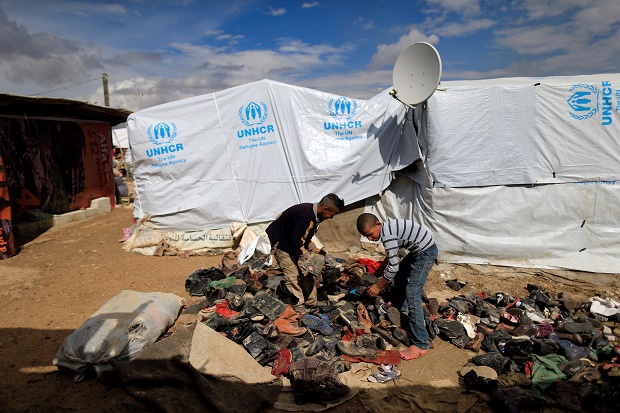UN aid chief: End Syrian war and aid millions who need help

Syrian refugee boys help their family to collect shoes to be added under a fire to boil water outside their family’s tent at a refugee camp in the town of Hosh Hareem, in the Bekaa valley, east Lebanon, Wednesday, Oct. 28, 2015. The United Nations said Tuesday the worsening conflict in Syria has left 13.5 million people in need of aid and some form of protection, including more than six million children. AP
UNITED NATIONS — The UN humanitarian chief urged key powers on Monday not to squander the momentum to end the Syrian conflict, pointing to 13.5 million people in desperate need of aid, over four million Syrians seeking refuge elsewhere, and the indiscriminate use of weapons continuing unabated.
Stephen O’Brien told the UN Security Council that some 400,000 Syrians have made the perilous journey across the Mediterranean this year — representing over 50 percent of those heading to Europe by sea — and without a political settlement, more will follow every day even as winter approaches.
He urged world leaders to seize the momentum from this weekend’s international talks in Vienna to put an end to “this horrendous war” that has cost an estimated 250,000 lives, given rise to extremist and terrorist groups, and reduced much of what was once a middle-income country “to rubble.”
O’Brien addressed the council hours after the United Nations and the leaders of Britain, Germany, Norway and Kuwait issued a joint announcement saying they will host a conference in London in February to step up funding for the Syrian humanitarian crisis.
READ: World leaders converge to condemn Paris terror, narrow Syria divide | Experts say states lack legal authority to block refugees
Article continues after this advertisementThe UN has received just $3.4 billion of the $8.4 billion humanitarian appeal for Syria this year — below last year’s level, the statement said.
Article continues after this advertisementThe four countries and the UN said world leaders and representatives of non-governmental organizations and civil society will be invited to the London conference to raise “significant new funding” and address longer term needs for jobs and education in order to offer “all those that have been forced to flee their homes greater hope for the future.”
Secretary-General Ban Ki-moon’s latest report on Syria said widespread conflict and high levels of violence including “indiscriminate and disproportionate aerial bombings and ground attacks” on areas with large civilian populations by government forces, opposition fighters and “terrorist” groups caused over 190,000 people to flee their homes in October. That figure was significantly higher than the 120,000 people O’Brien estimated were displaced in a briefing to the council on Oct. 27.
In one harrowing example of last month’s violence, O’Brien said several airstrikes hit a market in the Damascus suburb of Douma on Oct. 30, killing at least 60 civilians and injuring 200. The previous day, at least 15 civilians were killed and 50 injured when airstrikes reportedly hit the main field hospital in Douma.
“Following these attacks,” O’Brien said, the rebel group Jaish al-Islam “reportedly used dozens of prisoners as human shields, placed in cages around heavily populated areas to seek to deter further airstrikes in civilian areas.”
Leila Zerrougui, the UN envoy working to protect children in armed conflict, predicted significant increase in the cumulative death toll of Syrian children, which was estimated at 10,000 in 2014.
The majority of children have been killed or injured as a result of indiscriminate attacks on civilians and she blamed all parties.
Zerrougui said the Islamic State extremist group has committed “brutal atrocities” against children, citing as one example “recent horrific video footage allegedly portraying the mass execution of 200 children.” The group has also reportedly executed children it recruited for trying to escape.
Zainab Hawa Bangura, the UN special envoy trying to combat sexual violence in conflict, accused “most of the belligerent parties” in Syria of using sexual violence “as a tactic of war.”